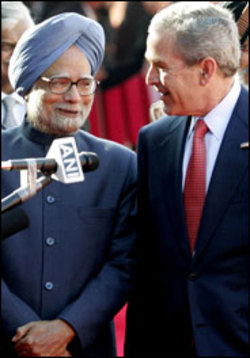Iran Learns from North Korea
Posted by Derek Chollet
As we all focus on the escalating problem with Iran, there seems to be some serious cognitive dissonance about another nuclear problem – North Korea. Remember that other part of the “axis of evil?” The U.S. approach to these problems has been largely the same, as have the results. Writing in yesterday’s Boston Globe, my colleague (and occasional DA contributor) Jon Wolfsthal and I take a look at this. Here’s some of what we say:
For nearly three years the Administration approached the North Korea issue by wavering between half-hearted diplomacy and uncoordinated pressure tactics, refusing to talk to North Koreans face-to-face and choosing instead to argue over the shape of the table.
It was not until last fall that American diplomats began to act decisively. Secretary of State Condoleezza Rice swept into office pledging that the “time for diplomacy is now,” and empowered Assistant Secretary Christopher Hill to deal directly with the North Koreans. This new engagement worked, as Hill extracted important pledges from Pyongyang to dismantle its nuclear programs in exchange for discussions about possible cooperation on alternative energy sources.
But even then the administration began to falter. As soon as the North Koreans inevitably and expectedly tried to negotiate for more, the Administration reverted back to its previous approach and allowed important but secondary issues like North Korea’s counterfeiting American currency to get block progress. The September deal unraveled, and now seven months later, the U.S. is back at square one – no other six-party talks are even scheduled. Meanwhile Pyongyang has quadrupled its nuclear arsenal potential and continues to operate a plutonium production reactor and could extract the material as early as this month, providing it with enough material to take its suspected nuclear arsenal from 9 to 12 nuclear weapons.
Instead of walking away from the problem, the U.S. must work to test North Korea’s willingness to deal by engaging them directly. Rather than allowing less urgent issues to stand in the way, it should offer to meet with North Korea anytime and anywhere to make rapid progress on the nuclear issue. And in the event that North Korea’s nuclear ambitions cannot be reversed, the U.S. needs to act now to shore up its deterrence on the peninsula, including by bringing back the troops moved from Korea to Iraq back and strengthening tactical missile defenses, and air and naval forces.
Finding a way to jump-start dealing with the North Korea threat is critical for the stability of East Asia; but it will also shows a possible way out of our current impasse with Iran. North Korea’s success in acquiring a nuclear capacity has provided Iran with a reliable playbook -- one they continue to use with great success.




